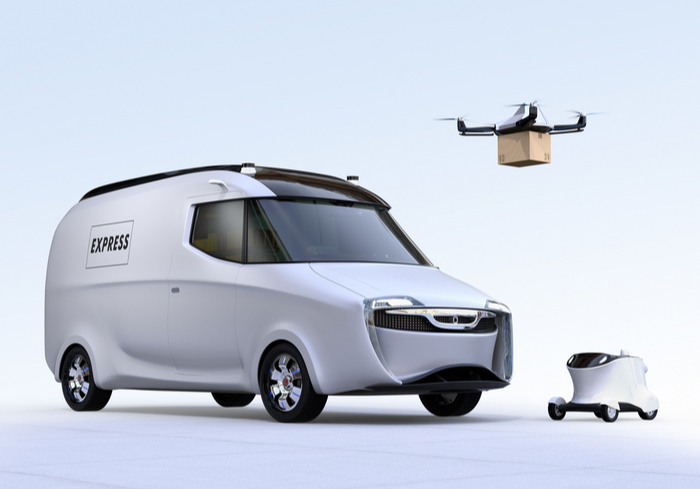The Future Of Retail Deliveries With Autonomous Vehicles

When it comes to online orders, retailers selling groceries — or even takeout food — face a constant balancing act: How can they quickly deliver orders at a reasonable price? As self-driving cars become more of a reality and less of a distant dream, autonomous vehicles — including trucks — might help retailers reach that goal as they explore a world in which they don’t need drivers for deliveries. Kroger, for example, is partnering with tech company Nuro for the pilot of an on-road, fully autonomous delivery service for customers.
With the test, for example, Kroger customers can place same-day delivery orders through the grocer’s ClickList ordering system and Nuro’s app. Then, Nuro’s fleet of autonomous vehicles will take to the streets and deliver the orders. However, there’s a larger strategy at play than just delivery. The move comes as Kroger — like many retailers — is making a push into digital with its Restock Kroger initiative and seeking to expand its coverage area. Self-driving vehicles may help the company reach that goal as “partnering with Nuro, a leading technology company, will create customer value by providing Americans access to fast and convenient delivery at a fair price,” Kroger Chief Digital Officer Yael Cosset said in an announcement.
Though Kroger’s test marks the first application and deployment of Nuro’s hardware and software, the sun may just be the beginning of a new wave of future innovations. Nuro Co-founder Dave Ferguson said that the technology will be a “game-changer for local commerce,” adding that the company’s service paired with Kroger’s brand is a “powerful first step in our mission to accelerate the benefits of robotics for everyday life.”
Mobility Companies
Silicon Valley startups aren’t the only companies getting in on the autonomous delivery action — and linking up with retailers. Car manufacturers are working on the technology too, while drawing up partnerships along the way. Toyota, for example, has moved one step closer to making its self-driving cars a reality by partnering with several companies — including Amazon — to develop the vehicles that will deliver packages, food and even people to desired locations.
According to reports, the automaker has partnered with Amazon, Pizza Hut, Uber, Mazda and Chinese ride-hailing giant Didi Chuxing to both develop and utilize the autonomous electric cars.
“It’s my goal to transition Toyota from an automobile company to a mobility company, and the possibilities of what we can build, in my mind, are endless,” said Akio Toyoda, the automaker’s president, at the Consumer Electronics Show (CES) in January.
Beyond Toyota, Ford has partnered with Postmates to test its self-driving technology for deliveries, CNBC reported. The companies will conduct pilot services throughout the year to evaluate the effectiveness of self-driving tech, according to plans laid out by Ford CEO Jim Hackett in a speech at CES. Ford, the second-largest automaker in the U.S., is also launching and testing a new Transportation-as-a-Service (TaaS) platform this year. It plans to work with partners, seeking to access its fleet of self-driving vehicles, to deliver services or products.
The (Driverless) Road And Sky Ahead
In the future, driverless vehicles might not be the only innovation to shape the way retailers deliver online orders. Amazon, for instance, has a new patent in its portfolio for technology that allows self-driving trucks to interface with drones. Those drones — or cars, messengers and robotic couriers — might make the delivery to its destination, but this was not the first patent Amazon has received for drone-related technology.
Amazon was previously awarded a patent for a drone that will use recognition of human gestures and voice commands to deliver packages. The patent for “Human Interaction with Unmanned Aerial Vehicles” was filed with the United States Patent and Trademark Office on July 18, 2016. The drone may include propulsion technology that manages the drone’s speed and trajectory. In addition, there will be a sensor and management system that can detect “visible gestures, audible gestures, and other gestures capable of recognition by the unmanned vehicle.”
Will these drones — along with self-driving vehicles — be able to provide fast and affordable delivery for retailers? Time will tell, but the autonomous driving technologies in development by tech companies and car manufacturers may just change the way that retailers view delivery going forward.